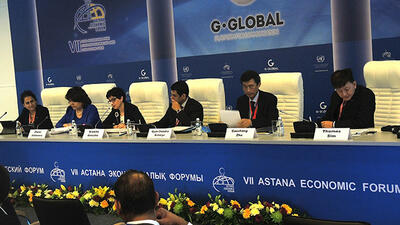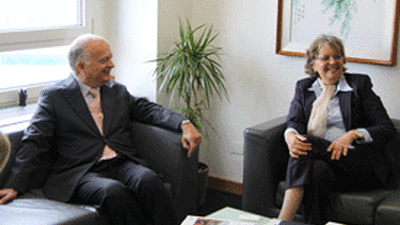From public-private partnerships to competitiveness and obstacles to trade (en)
Panellists at parallel sessions at the first day of WEDF 2012 discuss public-private partnership, the critical role of infrastructure to enhance competiveness, and how non-tariff obstacles to trade can be overcome.
WEDF participants were treated to three parallel sessions during the first day of WEDF 2012. The first of these were, ‘Good Practices in PPPs: Financing and operating infrastructure projects and how this success can be replicated’.
Panellists concluded that Governments attracting private financing for projects should establish a predictable legal and regulatory framework, including for dispute settlement, and by proper identification of projects. They also argued that projects should be awarded transparently through a competitive process.
By providing financial guarantees, there is reduced risk-exposure of both the contracting agency and the private sector counterpart. Recently, there has also been an increase in the instances of government grants for socially desirable projects. And while there is a limited role for unsolicited proposals, these are considered only if they involve a new concept and technology that only one company may be able to provide. However, the panellists argued that rigorous standards should be put in place to deal with such proposals, which should be the exception rather than the rule.
At the second session, ‘From Business Concerns to Policy Action: Overcoming non-tariff obstacles to trade’, panellists looked at the wide range of requirements exporting companies seeking access to foreign markets and companies importing products need to comply with.
The audience hear how small businesses can face a variety of barriers related to NTMs, ranging from labelling requirements to safety and sanitary measures, as well as problems with changing rules and regulations and time-consuming inspections.
It was argued that the private sector itself can mitigate the effects of NTMs by actions such as timely preparation of documents and providing detailed product descriptions to avoid confusion at customs. Panellists also argued that buyers, suppliers and policymakers have a shared responsibility to address NTMs, and that a public-private dialogue can help enterprises to deal with NTMs and policymakers to support them.
‘Enabling Services: The critical role of infrastructure services in enhancing overall competitiveness’ was the topic of the third session during the first day of WEDF 2012.
Here the key message was that Governments must do more to promote innovation and enable a better regulatory environment to boost infrastructure services.
Panellists argued that an effective way of boosting infrastructure services is to set up a coalition bringing together the main industry stakeholders. Through a public-private dialogue mechanism, they may identify the most important areas where interventions are required.
They also argued that logistics infrastructure depends heavily on the supply of talent, which is part of the soft infrastructure. Therefore, education programmes need to be adjusted to be aligned with business needs in a rapidly transforming sector.
Read the full summary of parallel session I: Good Practices in PPPs: Financing and operating infrastructure projects and how this success can be replicated
Read the full summary of parallel session II: From Business Concerns to Policy Action: overcoming non-tariff obstacles to trade
Read the full summary of parallel session III: Enabling Services: The critical role of infrastructure services in enhancing overall competitiveness





